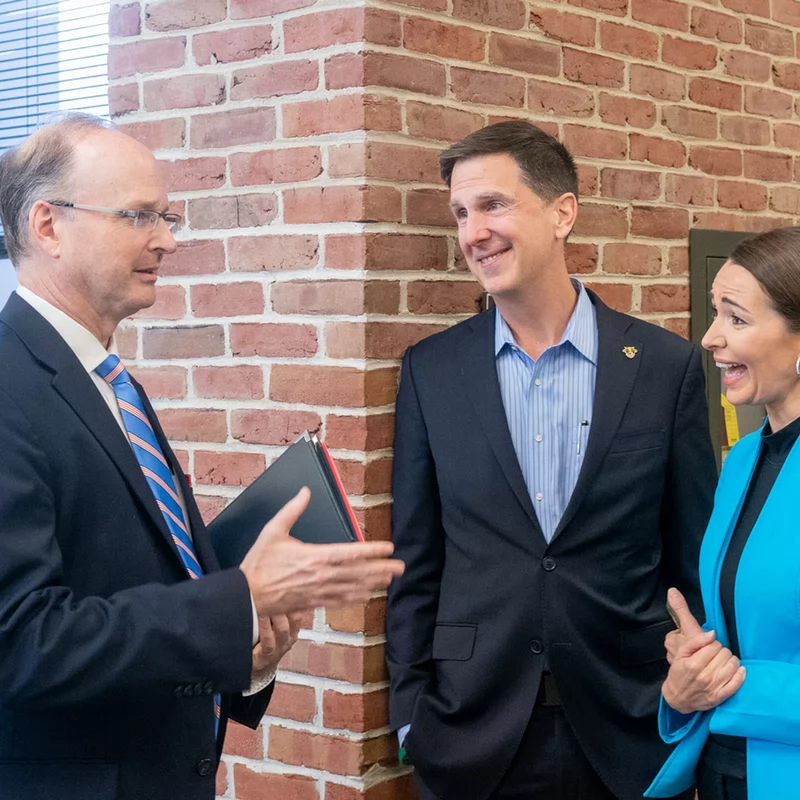Lead with Purpose and Strategic Insight
Today’s communication leaders must navigate complexity with clarity and integrity. The MSCL program helps you step into that role with confidence. Through flexible, fully online coursework, you’ll deepen your strategic thinking, strengthen your leadership capacity and learn to communicate in ways that drive meaning and measurable impact.
You’ll join a supportive community of professionals committed to purposeful leadership—and gain the tools to lead teams, influence strategy and guide organizations through change.
Why Choose the MSCL at Belmont?
If you're ready to move beyond tactical execution, MSCL bridges the path to strategic influence. You’ll learn to align communication with mission, lead through uncertainty and make decisions grounded in data and ethics.
Communication today demands more than managing messages—it requires leadership that drives meaning and measurable impact. The MSCL program equips you to lead through change, align communication strategy with mission and inspire others to act. Whether you’re advancing, accelerating or pivoting in your career, you’ll build the strategic insight and confidence to lead at the highest level.
Led by experienced faculty who blend scholarship with professional practice, the MSCL curriculum integrates theory, research and real-world application. You’ll explore how data, ethics and digital transformation—including the influence of artificial intelligence—are redefining the practice of strategic communication and shaping the future of leadership.
Program Distinctions
- Executive Readiness: Build the strategic, analytical and ethical expertise demanded of today’s communication leaders.
- Applied Learning: Transform theory into results through projects rooted in your professional context.
- Mission-Driven Perspective: Cultivate leadership grounded in purpose, integrity and transformational impact.
Every element of the MSCL experience—from flexible online learning to applied projects and faculty mentorship—is designed to help you grow as both a communicator and a leader.
Is the MSCL the Right Fit for You?
MSCL serves professionals seeking purposeful growth at every stage:
- Strategic Practitioner: Mid-career communicators ready for broader leadership
- Emerging Strategist: Early-career professionals seeking advanced training in strategy, analytics and leadership
- Sector Switcher: Leaders in education, nonprofit or business transitioning into communication-focused roles
Credential Credit: Earn up to 3 credits for related professional certifications, eg., APR, ABC, GCCC®.
What You'll Gain
Each course is built for immediate application. You’ll strengthen your strategic and leadership capacity in the context of your own organization or professional goals.
By the end of the program, you’ll be able to:
- Think Strategically: Analyze complex challenges and develop strategies that align with mission and values.
- Lead Effectively: Inspire and manage teams through clarity, collaboration and discernment.
- Act Ethically: Navigate legal, social and organizational complexities with integrity.
- Innovate Creatively: Leverage emerging technologies and design forward-thinking solutions.
- Engage Globally: Build trust and understanding across diverse audiences and cultures.
- Measure Impact: Use data and analytics to evaluate performance and guide decision-making.
Request Information
Program Details
M.S. in Strategic Communication & Leadership (30 Credits)
The 30-credit curriculum is intentionally flexible—choose electives that align with your professional pathway while building a leadership-focused core that every communication executive needs.
The MSCL curriculum blends leadership theory, applied strategy and professional practice, designed to deepen your expertise and expand your influence.
Program Structure
- Core Requirements (18 credits): Strategic communication, organizational culture, analytics, crisis management, ethics and leadership.
- Directed Electives (9 credits): Tailor your studies through topics such as consulting, media strategy, storytelling, global communication and financial management.
- Capstone Project & Portfolio (3 credits): Apply your learning to a real-world challenge and showcase your leadership impact.
Core Requirements
You will complete the following 18 credits of core requirements:
SCL 6105: Foundations of Strategic Communication & Leadership (3 credits)
Introduces students to the principles and practices of strategic communication and leadership. Emphasizes the role of the chief communication officer (CCO), strategic planning frameworks, foundational theories of leadership and the development of a personal leadership philosophy in the context of organizational mission and communication effectiveness.
SCL 6125: Organizational Communication & Culture (3 credits)
Explores the communication dynamics within organizations and the influence of culture on internal and external communication. Examines how leaders shape, reinforce and transform organizational culture to drive mission-aligned outcomes.
SCL 6215: Data-Driven Communication & Analytics (3 credits)
Equips students to leverage data in strategic communication decision-making. Covers audience research, message testing, formative and summative evaluation and storytelling with data. Emphasizes applied research skills using both quantitative and qualitative sources to generate strategic insight.
SCL 6325: Crisis Communication & Reputation Management (3 credits)
Prepares students to lead through uncertainty by developing communication strategies for crisis response and recovery. Focuses on protecting and restoring organizational reputation and the role of communication leaders in navigating high-stakes situations.
SCL 6335: Ethics, Law, & Governance in Communication (3 credits)
Examines ethical decision-making, legal frameworks and corporate governance issues in strategic communication. Emphasizes leadership responsibility, regulatory compliance and organizational transparency.
SCL 6345: Leadership & Innovation in Communication (3 credits)
Explores how communication leaders drive innovation, foster adaptability and lead change within organizations. Reinforces personal leadership development by encouraging students to refine their leadership approach, apply systems thinking and lead with strategic foresight in complex environments.
Directed Elective Options
You will complete nine (9) credits from the following elective options:
SCL 6415 Interpersonal Dynamics & Strategic Conversations (3 credits)
Focuses on the human dimensions of leadership communication, including emotional intelligence, conflict resolution and negotiation. Prepares students to lead high-stakes conversations and influence through relational insight.
SCL 6425 Stakeholder Engagement & Relationship Management (3 credits)
Explores how to identify, prioritize and engage internal and external publics. Emphasizes mutuality, trust-building and metrics for managing long-term stakeholder relationships.
SCL 6455 Digital Communication & Emerging Technologies (3 credits)
Analyzes current and emerging digital tools and platforms shaping strategic communication. Topics include social media strategy, digital storytelling, artificial intelligence and content innovation.
SCL 6465 Strategic Storytelling & Content Creation (3 credits)
Equips students to craft compelling narratives that align with organizational strategy. Emphasizes message development, audience alignment and multimedia content production for diverse platforms.
SCL 6475 Strategic Media Relations & Public Affairs (3 credits)
Prepares students to navigate media environments and engage public-sector stakeholders. Focuses on media strategy, message discipline, advocacy and communication in politically sensitive contexts.
SCL 6485 Integrated Communication Planning (3 credits)
Guides students through the development of cross-platform communication strategies aligned with organizational objectives. Emphasizes research-informed planning, tactical integration and performance evaluation.
SCL 6495 Global Communication & Cross-Cultural Leadership (3 credits)
Explores the complexities of communicating across cultures and borders. Prepares students to lead diverse teams, adapt messaging for global audiences and manage international communication challenges.
SCL 6615 Consulting & Client Relationship Management (3 credits)
Prepares students for external-facing leadership roles. Covers consulting models, client onboarding, service delivery and managing long-term client relationships in agency and freelance settings.
SCL 6625 Financial Management for Communications (3 credits)
Introduces core financial concepts relevant to communication professionals in organizational, agency or consulting settings. Topics include budgeting, forecasting, pricing models, profitability and financial decision-making to support strategic communication planning, resource management and sustainable operations.
Capstone Requirement
In your final term, you will complete:
SCL 6998: Capstone Project & Portfolio (3 credits)
A culminating experience in which students synthesize and apply their learning through a strategic communication project and professional leadership portfolio. Students may design a communication initiative, develop a consultancy or business plan or address a complex organizational challenge. The course also emphasizes professional identity development, leadership reflection and the presentation of a final portfolio that demonstrates strategic insight, applied competence and personal growth.
Graduates of the MSCL program move confidently into senior communication and leadership roles across industries—guiding strategy, shaping culture and driving organizational performance.
Our alumni lead in organizations and mission-driven ventures across the country, including corporate, nonprofit, education and public sectors.
Wherever you aspire to lead—from corporate boardrooms to nonprofit organizations—MSCL prepares you to make your mark with clarity and purpose.
Career Paths
- Chief Communication Officer (CCO)
- Vice President or Executive Director of Communications
- Vice President of Marketing & Communications
- Director of Corporate Communications
- Director of Brand & Reputation Management
- Director of Public Relations or Media Relations
- Director of Stakeholder or Community Engagement
- Head of Strategic or Integrated Communications
- Communication or Leadership Consultant
- Brand, Content or Digital Strategy Lead
- Internal or Employee Communication Director
- Public Affairs or Government Relations Director
Although MSCL is fully online, you’ll never feel disconnected. Every element of the program is designed to foster genuine relationships and real-world relevance.
Distinctive Experiences
- On-Campus Orientation: Kick off your journey in Nashville in August at an on-campus orientation that builds community and readiness for graduate study.
- Applied Learning: Case studies, simulations and client projects translate theory into immediate practice.
- Professional Mentorship: Learn from faculty who bridge academic insight and industry expertise.
- Leadership Immersion Workshops: Optional virtual events connect students with industry leaders and alumni mentors.
- Capstone Project & Portfolio: Demonstrate strategic insight and leadership through a project tailored to your career goals.
- Continuous Support: Access professional coaching, development resources, wellness services and ongoing faculty engagement.
From your orientation to your final Capstone Portfolio, you’ll experience a transformation that’s both professional and deeply personal.
Applying to the MSCL program is straightforward—and designed for working professionals ready to take the next step.
Application Requirements
- Bachelor’s Degree from a regionally accredited institution (communication or related field preferred)
- Official Transcripts from all colleges or universities attended
- Minimum GPA: 3.0 preferred; conditional review available for applicants below 3.0 with evidence of readiness
- Professional Résumé or CV demonstrating communication or leadership experience
- Statement of Purpose outlining career goals and program fit
- Two Letters of Recommendation (one academic, one professional) attesting to readiness and leadership potential
Additional Information
- Transfer Credit: Up to six (6) graduate hours may transfer (B or higher, within five years).
- Application Review: Rolling admissions; early application recommended for preferred start term.
- No GRE or GMAT requirement.
Our admissions team and program director are available to discuss your goals and help you determine whether MSCL is the right next move in your leadership journey.
Tuition: $1,100 per credit hour
A limited number of Purposeful Excellence Scholarships are awarded each term to exceptional applicants who demonstrate professional promise and strong alignment with the program’s mission.
Each scholarship is renewable for students who maintain strong academic performance and continuous enrollment.
Selection Criteria
Scholarships may be awarded to admitted students who:
- Demonstrate excellence in strategic communication through academic or professional experience.
- Exhibit clear leadership potential and a commitment to purposeful communication.
- Articulate personal and professional goals that align with the MSCL program’s mission.
- Submit their enrollment deposit by June 1 (fall entry) or Nov. 1 (spring entry).
Renewal Eligibility
Recipients remain eligible each term by:
- Completing at least two courses (six credits) in the prior term
- Earning a grade of B or higher in all courses.
Scholarship awards are determined by the Program Director and communicated to eligible students following the June 1 and Nov. 1 deposit deadlines.
Voices of Experience
Learn with Purposeful Scholar-Practitioners
In the MSCL program, you’ll learn from faculty who lead with both expertise and purpose. Each professor brings real-world experience in communication, leadership and strategy—paired with a deep commitment to mentoring professionals who want to make a meaningful impact. Rooted in Belmont’s mission to develop leaders of purpose, character and wisdom, our faculty are experienced scholar-practitioners who integrate theory, research and practice to help you think critically, lead ethically and communicate with clarity.
Frequently Asked Questions
The MSCL stands apart for its integration of communication, strategy, leadership and purpose. You’ll learn from scholar-practitioners who connect theory to real-world impact and you’ll graduate equipped to lead—not just manage—communication at the highest levels.
All courses are 100% online and asynchronous, designed in accelerated and focused terms so you can balance full-time work, family and graduate study. Optional live sessions and one-on-one faculty connections provide personal engagement without rigid scheduling.
Most students complete the 30-credit program in 16–21 months, taking one class at a time. You can adjust your pace each term, completing the degree faster or slower depending on your professional and personal commitments.
The MSCL is designed for mid-career professionals in communication, marketing or leadership roles—as well as early-career strategists and professionals looking to pivot into strategic communication. If you want to move from executing tactics to shaping strategy, this program is for you.
Graduates are prepared for executive-level roles such as Chief Communication Officer, Director of Strategy, Agency Leader or Communication Consultant. The program builds the strategic insight, leadership confidence and analytical fluency needed to guide organizations with clarity and purpose.
Yes. Specific to this program, the Purposeful Excellence Scholarship is a competitive, renewable award offered each term to exceptional applicants who demonstrate professional promise and strong alignment with the program’s mission.
Additionally, to determine your eligibility for any financial aid, graduate students should complete the Free Application for Federal Student Aid (FAFSA). The FAFSA is available online and should be completed each year. Complete and return the FAFSA by the February 15 priority date.
Belmont will start the financial aid awarding process in late February and will continue throughout the spring semester.
All new students attend a non-credit August orientation in Nashville, designed to build community, introduce faculty and prepare you for online learning success. It’s an energizing experience that sets the tone for purposeful, connected study.
Contact Us
College of Liberal Arts & Social Sciences
Sophie Chua
Admissions Coordinator
(615) 460.8335














